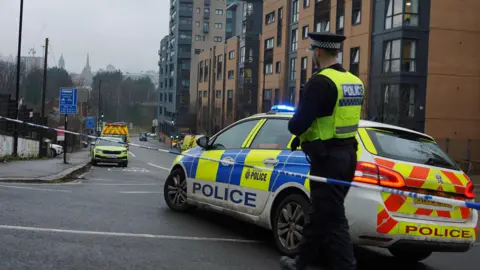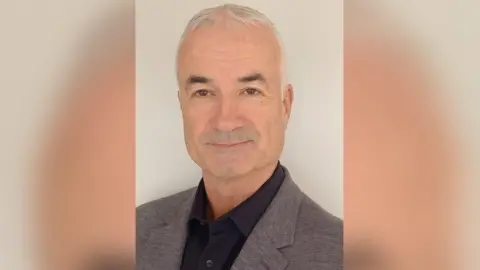'Being a police negotiator is not like it is in the movies'
 BBC
BBCAfter a 36-hour stand-off brought parts of Sheffield to a standstill and saw dozens of people evacuated from their homes, two former negotiators have spoken about the important role they play in bringing incidents to a safe conclusion.
Martin Richards and Scott Walker, who both worked for the Metropolitan Police, said the main objective was getting everyone out safely by gaining trust, building a rapport and showing empathy.
"Using specialist negotiators is the safest way to end any incident - to get the person out of the premises rather than police going in," said Mr Richards, a former hostage and crisis negotiator.
The first step is to establish contact, he said.
If the police cannot trace a number for the person they would send in a "field phone", Mr Richards explained, adding that a dog or a drone may be used to get the device to them in certain circumstances.
He said the negotiator would likely be based in nearby premises such as a commandeered pub or cafe, holed up in a quiet, separate room.
Working in rotation to keep the line of communication open, negotiators are often kept in the dark about the incident commander's plans in case they give anything away, even by something as minor as a change in intonation or pace.
Mr Richards said after contact had been established, it was important to make the person feel in control of the situation.
"People are often stressed because their basic needs are being affected," he said.
"They've got no certainty about what's going to happen. They think 'well, the police are just going to come in and arrest me or shoot me'.
"They don't feel safe."
But, he said while negotiators must employ "active listening" and use certain words to manipulate the situation, it was also important to be honest and manage expectations.
"It's not like the films where somebody says 'I want a helicopter...or give me a car to take me to the airport'," said Mr Richards, who now works as a kidnap and extortion response expert for a marine security company.
"Then the negotiator will say something like 'we'll see what we can do' - that is absolute nonsense."
He added: "We'll be very honest with them and tell them they are going to get arrested and that we are not going to go away.
"But we will say, 'you decide when you come out, we don't'."
 Martin Richards
Martin RichardsScott Walker, a former kidnap for ransom negotiator and author of the book Order Out of Chaos, said another key role was "buying time".
"Time allows the emotions to settle down a bit so the person becomes less anxious, less stressed and less overwhelmed," he said.
"The longer we can spread that out the easier it is to start bringing about calm, objective, rational thinking and behaviour.
"And while that person is communicating with the negotiator, they're not harming themselves or anybody else."
Mr Walker said it was important for negotiators to "suspend judgement" in order to get a successful outcome.
"It's actually coming along with more curiosity than assumption, because assumptions are like earplugs," he said.
"All of us want to feel seen, heard and understood and once that happens, people are more likely to follow instructions - and that can take time."
He said the default response of "raiding a premises and sending in a SWAT team" was often not sensible as it was too high risk, with a resolution through "cooperation or collaboration" the best and safest approach.
Mr Richards said that a lot of the negotiating towards the end of an incident is about "saving face".
"At this stage now they want to give up, but are too embarrassed to give up.
"Because they haven't achieved anything, probably, and everyone knows who they are and will have seen them on the news.
"So we have to be very careful at that point."
He said ways to "shift" the negotiation back were to reassure the person that "people forget news", that the attention is temporary and that somebody out there somewhere loves them.
Negotiation may be abandoned when there is an "imminent serious threat to life," but the commander may not tell the negotiator this is about to happen, he added.
There have been other recent incidents across the region where negotiators have been required.
Last year police attended a domestic dispute in Leeds where a man was seen with a handgun. He later died in hospital.
And, in Harrogate, two teenagers were arrested after a four-hour stand-off, during which fire extinguishers, poles and glass bottles were thrown from a derelict building.
 Scott Walker
Scott WalkerOnce a police officer reaches a certain rank - and it differs from force to force - they can apply to do a negotiation training course.
"Negotiation is a skill that can be taught and it can be learnt," Mr Walker said.
"What it does need though, is an element of willingness to suspend your own ego, not be quick to judge and to be prepared to have patience," he added.
"With all of the kidnappers that I have negotiated with, I had nothing in common with them, I wasn't going to go for a beer or coffee with them.
"I didn't agree with what they were doing, but each time I had to remember, it's not about me and secondly, I first must seek to understand before being understood."
Mr Richards added: "You know you've done a good job when no one is injured and everybody is safe."
A 47-year-old man charged in connection with the incident in Sheffield appeared in court on Friday.
Yaqub Younis, of Broad Street, Sheffield, pleaded not guilty to affray, bomb hoax - communicating false information, intentionally/recklessly causing a public nuisance and criminal damage.
He is next due to appear at Sheffield Crown Court on 14 March.
Listen to highlights from South Yorkshire on BBC Sounds, catch up with the latest episode of Look North or tell us a story you think we should be covering here.
